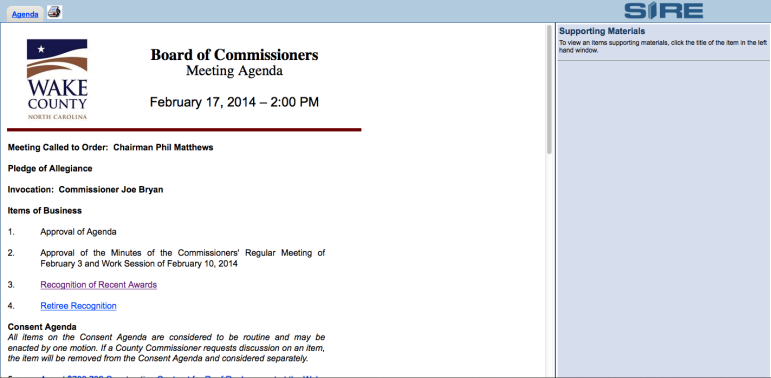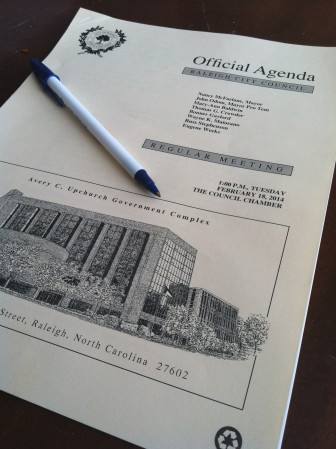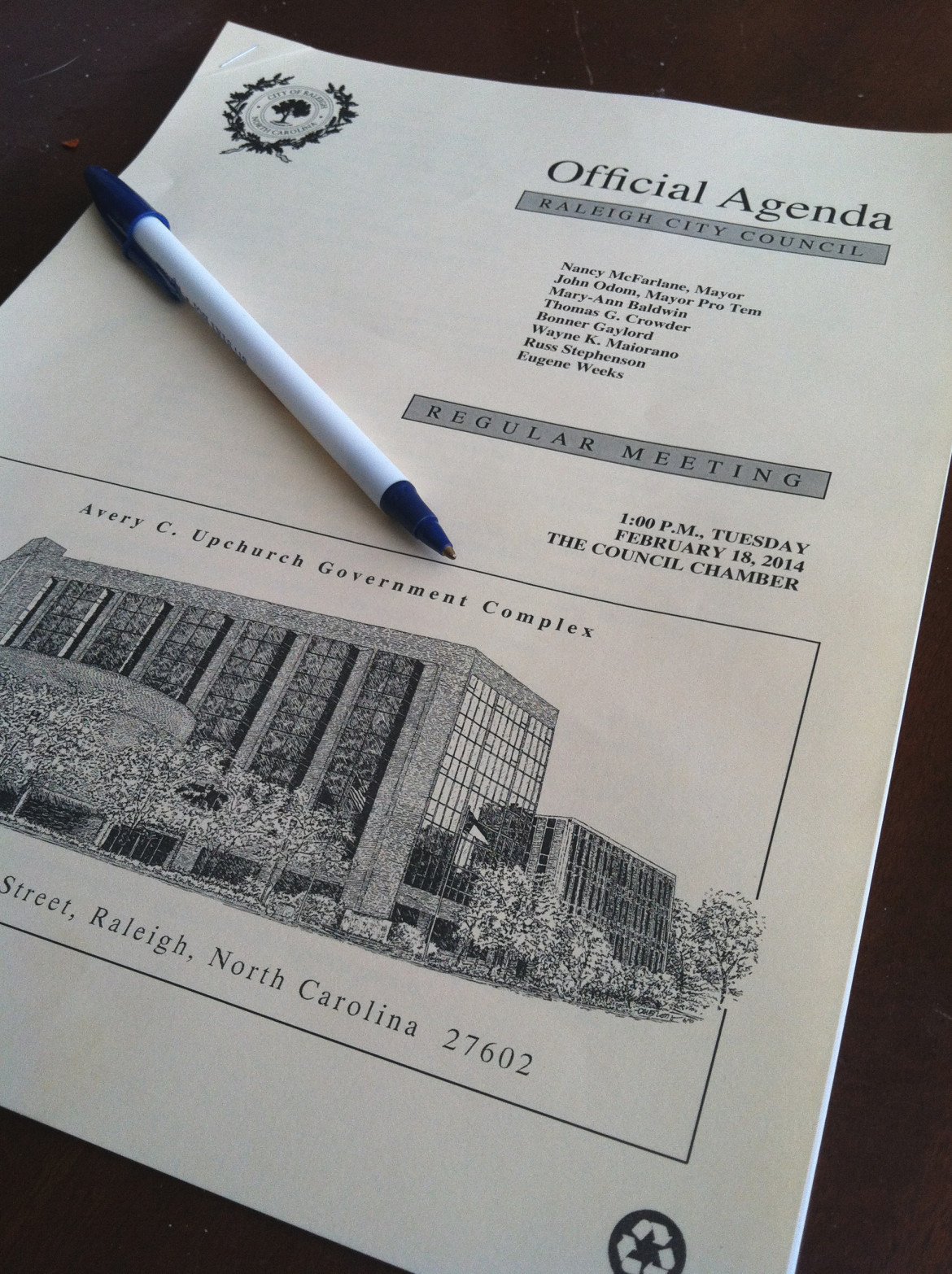Changes are underway to improve the language and the layout of Raleigh’s bi-monthly City Council agenda document, though it could be some time before residents see those changes occur.
First discussed at the recent Council retreat, new City Manager Ruffin Hall said he wanted to work with the Council to find ways to streamline the agenda’s format.
“Every now and then it’s probably a good idea to take a fresh look,” Hall said. “See what it looks like, how are the items grouped, what the content is.”
Although he did not list any specific changes, Hall said the staff is looking new ways to make the document and its contents available electronically.
The agenda is uploaded to the city’s website as a PDF. If it was created as an interactive document, denizens and Councilors would have the opportunity to dig deeper into the issues.
“I think it would be really interesting if they could find ways to tie issues and relate it to data that’s available on the open data portal,” said Jason Hibbets, a project manager at Red Hat and the author of “The Foundation for an Open Source City.”
Any changes to the document, Hall said, would likely be proposed by Council members.
“It’s not my agenda; it’s the Mayor and Councils’ agenda,” he said. “We’ve put this forward for their consideration.”
Hall explained that the new layout is not a high-priority issue.
“I think the agenda is fine the way it is,” he said. “This is something we’re going to be working on over a sort of a moderate process; there’s not a tremendous amount of urgency.”
A Digital Future
The Wake County Board of Commissioners last year made the switch to an all-digital format for their agenda. The Commissioners use tablet computers to access not only the agenda, but also any relevant supplemental data.

A screenshot of the Wake County Commission agenda. Clicking on an item with a hyperlink prompts pdfs of supporting materials to appear in the right side.
“We have our Commissioners using iPads, using iLegislate,” said Wake County Manager Joe Durham. “It’s been tremendous — less utilization of paper and a great utilization of automation and technology.”
Although Hall said there are no plans to make a similar switch, creating a new, online version of the agenda could give taxpayers better insight into their government and the city around them.
Red Hat’s Hibbets said one way the Council could take advantage of existing technologies is to link agenda items to any and all background information available.
“Say there was an affordable housing item on the City Council agenda, you can have a pointer to say, ‘Hey citizens, by the way, you can see where all the affordable housing is on a map through an open data portal,’” he said.
This kind of information would also be useful to Councilors, Hibbets said.
“If there’s data available that can help them make a better decision when looking over an issue, and it can just be a link to a map with crime data or fire data or whatever we’ve got in the system, I think that would be a tremendous help,” he said.
Reid Serozi works for Socrata, which developed the city’s Open Raleigh data portal website. He said there has not been any discussion on linking an electronic version of the agenda to relevant information from the portal.
“Think of all the internal database systems that are inside the city of Raleigh, like building permits,” Serozi said. “We work with the government to extract that internal database data and then expose it through our portal so you can consume it.”
The Current Agenda
The agenda is an extensive document put together twice each month by the City Manager’s office and the City Clerk. It includes everything from background information and staff recommendations on matters requiring Council approval to summations of denizen petitions.
The first item on the agenda for Feb. 18 regards the issuance of a pawnbroker license, and the level of detail provided demonstrates why the document is often more than a dozen pages long.

Ariella Monti / Raleigh Public Record
The name of the applicant, the address of the proposed shop and input from the planning, fire and police departments are all included. Because the police found the applicant has an outstanding citation for an alleged violation of the pawnbroker statute, the staff recommendation to Council is to deny the license application.
“Our agenda is pretty detailed; it really is compared to most other local governments,” said Louis Buonpane, a programs manager with the City Manager’s office.
Buonpane said the procedure for putting together the agenda is a needs-driven process, depending on what items various departments may need approval on from City Council.
“An example is a contract,” he said. “If it’s a construction project in excess of $300,000, it needs to be approved by City Council. That’s an example of city policy that dictates what goes on the agenda.”
When such an issue is present, the relevant department will submit the item to the City Manager’s office on the Monday of the week before a Council meeting.
“I think the process of generally how it’s put together is fine,” Hall said. “I’m really talking more about, how is the document laid out, how is it pulled together.”
A Denizen-Friendly Agenda
Although he supports the depth of detail currently provided by the agenda, Buonpane said it’s important to make sure it’s not overwhelming.
“The question then is, how citizen-friendly is it?” he said, adding that there is “perhaps too much detail.”
“That a involves a level of effort – not just people in the manager’s office but from people in other departments who are assembling information and submitting it to the process,” Buonpane said.
Hibbets said making the agenda easier to consume would be a “big step forward.”
Before delving into anything too ambitious, Hibbets said the city should “get us up to par with where other people are, then we can start thinking about what those new innovative ideas are.”
Hibbets said the city could look toward other municipalities and see how they present their agendas, taking what he described as an open-source approach.
“Let’s borrow those ideas and build upon them; we don’t need to invent the wheel, someone’s already done it,” he said.
